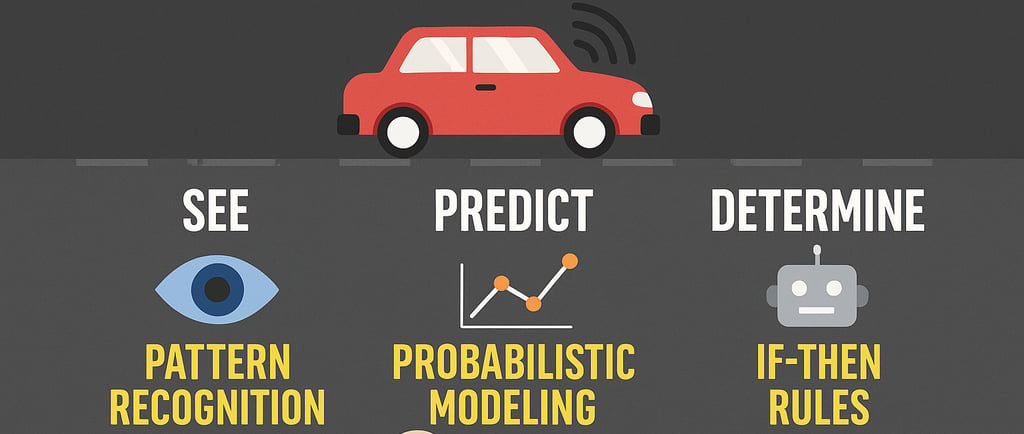Self Driving level 5
Self-driving cars don’t “reason” in the way humans do. They operate through a combination of pattern recognition, predictive modeling, and rule-based systems — not generalized logic. Here’s how it works, and why Apple’s research still applies
Mark Saymen
6/11/20251 min read


If current AI doesn’t reason logically… how does a self-driving car "drive"?
🔍 The Answer:
Self-driving cars don’t “reason” in the way humans do.
They operate through a combination of pattern recognition, predictive modeling, and rule-based systems — not generalized logic.
Here’s how it works, and why Apple’s research still applies:
🧠 1. Pattern Matching at Scale (NOT Reasoning)
Self-driving models (like Tesla’s FSD or Waymo) are trained on millions of hours of driving data.
They learn:
What a stop sign “looks like”
How to anticipate pedestrian motion
When other drivers slow down or swerve
This is pattern learning, not abstract reasoning.
⚙️ 2. Probabilistic Prediction, Not Deductive Logic
Cars don’t reason like:
“There’s a dog on the road, therefore I should stop.”
Instead, the model sees something shaped like a dog, assigns a probability, and triggers a learned action (e.g., braking).
It's all if-then weighted behavior driven by statistical models, not step-by-step logic.
🧩 3. Why Apple’s Findings Matter
Apple showed that when problems deviate from known patterns (like hard puzzles), reasoning AIs fail.
In driving terms:
What if the road is partially flooded, but the detour sign is wrongly placed?
What if a kid is chasing a ball into a blind turn, but the system hasn’t seen that scenario before?
In those unseen edge cases, the system’s limits emerge.
This is where humans reason, but today’s AI may guess — or fail.
⚠️ 4. This Is Why Full L5 Autonomy Is So Hard
True Level 5 autonomy (go anywhere, in any condition, with no human input) requires:
✅ Generalized reasoning
✅ Causal understanding
✅ Long-term planning
Today’s systems are stuck at narrow generalization, not human-like abstraction.
🚀 The Future?
We’ll need models that combine pattern recognition with reasoning systems — likely involving:
Hybrid AI architectures (neural + symbolic)
Causal inference
World modeling beyond language tokens
Until then, autonomy will advance — but slowly and with careful guardrails.
